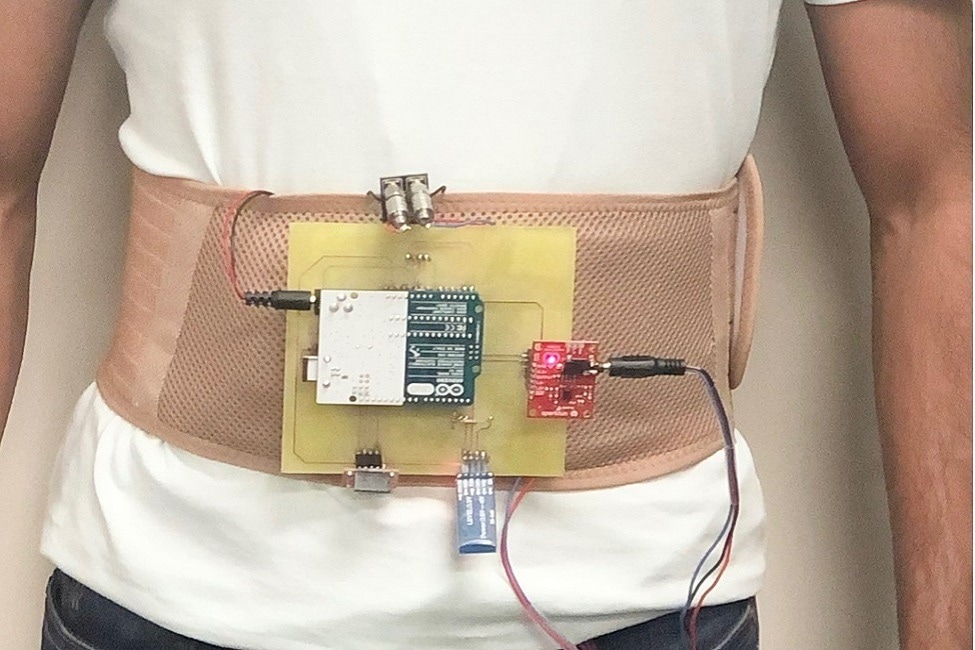Heart failure affects approximately 64 million people worldwide. The American Heart Association estimates that 6.2 million adult Americans currently have heart failure, and that number will rise to 8 million by 2030. Heart failure is a progressive clinical syndrome in which the heart’s structural abnormality prevents it from pumping enough blood to meet the body’s needs.

The lightweight belt continuously monitors all of the physiological parameters associated with heart failure in real time, 24/7. Image Credit: Florida Atlantic University
Currently, there are two systems for monitoring heart failure. They require surgery to implant under the skin, which makes them expensive and dangerous. Furthermore, only about 50% of heart failure patients require an implantable device or are eligible for the thoracic monitoring that these devices offer.
The thoracic region is the region between the neck and abdomen. The need for non-invasive methods to continuously track the progression of heart failure is urgent.
The Christine E. Lynn College of Nursing and the College of Engineering and Computer Science at Florida Atlantic University have worked together to create a prototype of a novel wearable device that can continuously monitor all of the physiological parameters related to heart failure in real time.
The system relies on sensors built into a thin belt that can be worn comfortably around the waist to track thoracic impedance, electrocardiogram (ECG), heart rate, and motion activity detection. To track these parameters, the system employs a variety of sensors. Thoracic impedance is a crucial bio-signal for tracking the development of heart failure.
ECG serves as a crucial bio-signal for the diagnosis and prognosis of cardiovascular diseases. The Holter monitor used for ECG is not appropriate for use at the point of care because it measures electrical signals passing through the heart.
Researchers tested the wearable device in a variety of settings for the study, which was published in the journal Scientific Reports, including sitting, standing, lying down, and walking. Results were obtained sequentially for each sensor under each condition. The physiological variables chosen play a key role in identifying heart failure symptoms.
The results demonstrated that all of the sensors monitored changes under all of the various circumstances. The wearer of the device could be identified by the position sensor’s accurate highlighting of positional changes under various circumstances.
The heart rate sensor also continuously monitored the heart rate. It is significant that the device accurately emphasized slight variations in thoracic impedance.
The wearable device’s ECG sensor, like those in most ECG monitors, was extremely sensitive to motion, especially while walking.
However, even when moving, the ECG sensor maintained its QRS complex and R-peaks, which are crucial signs of left ventricular hypertrophy, and growth in the size of the myocardial fibers in the primary cardiac pumping chamber. The QRS complex is the electrical impulse it travels through the ventricles of the heart.
All of the sensors we integrated into our belt module can easily be worn for a long period of time without affecting the patient’s daily activities. Importantly, continuous and real-time monitoring of heart failure symptoms could alert patients and their health care providers of the patient’s declining health. In turn, health care providers could intervene with medications to avoid patient hospitalization.
Waseem Asghar, PhD, Study Senior Author and Associate Professor, Department of Electrical Engineering and Computer Science, Florida Atlantic University
The researchers anticipate that their technology will have improved specificity, high sensitivity, and higher predictive values for heart failure.
Approximately 1 in 4 patients with heart failure are readmitted within 30 days of discharge from the hospital and about half are readmitted within six months. Health care wearable devices such as the prototype we have developed have the potential to decrease hospital readmissions in a cost-effective way that also is safe and convenient for the wearer.
Mary Ann Leavitt, PhD, Study Co-Author and Assistant Professor, Christine E. Lynn College of Nursing, Florida Atlantic University
As a result of the study’s findings, researchers are now testing the module on a variety of subjects to create an algorithm that will be able to predict heart failure based on the test set.
This wearable device to monitor heart failure is my main project in Dr Asghar’s Micro and Nanotechnology Lab in Medicine, which has important social implications for the fastest-growing cardiovascular disease in the US. We are developing a noninvasive solution that can be used by all heart failure patients for better management, diagnosis, and prognosis that will be able to serve the masses.
Sheikh Muhammad Asher Iqbal, Study First Author and PhD Student, Department of Electrical Engineering and Computer Science, Florida Atlantic University
Imadeldin Mahgoub, a Tecore Professor, and Sarah E. Du, an associate professor, both from the Florida Atlantic University’s Department of Electrical Engineering and Computer Science, are the study’s co-authors.
The Institute for Sensing and Embedded Network Systems Engineering (I-SENSE) at FAU and the College of Engineering and Computer Science at FAU provided funding for this study.
Journal Reference
Iqbal, S. M. A., et al. (2022) Development of a wearable belt with integrated sensors for measuring multiple physiological parameters related to heart failure. Scientific Reports. doi:10.1038/s41598-022-23680-1.
Source: https://www.fau.edu/